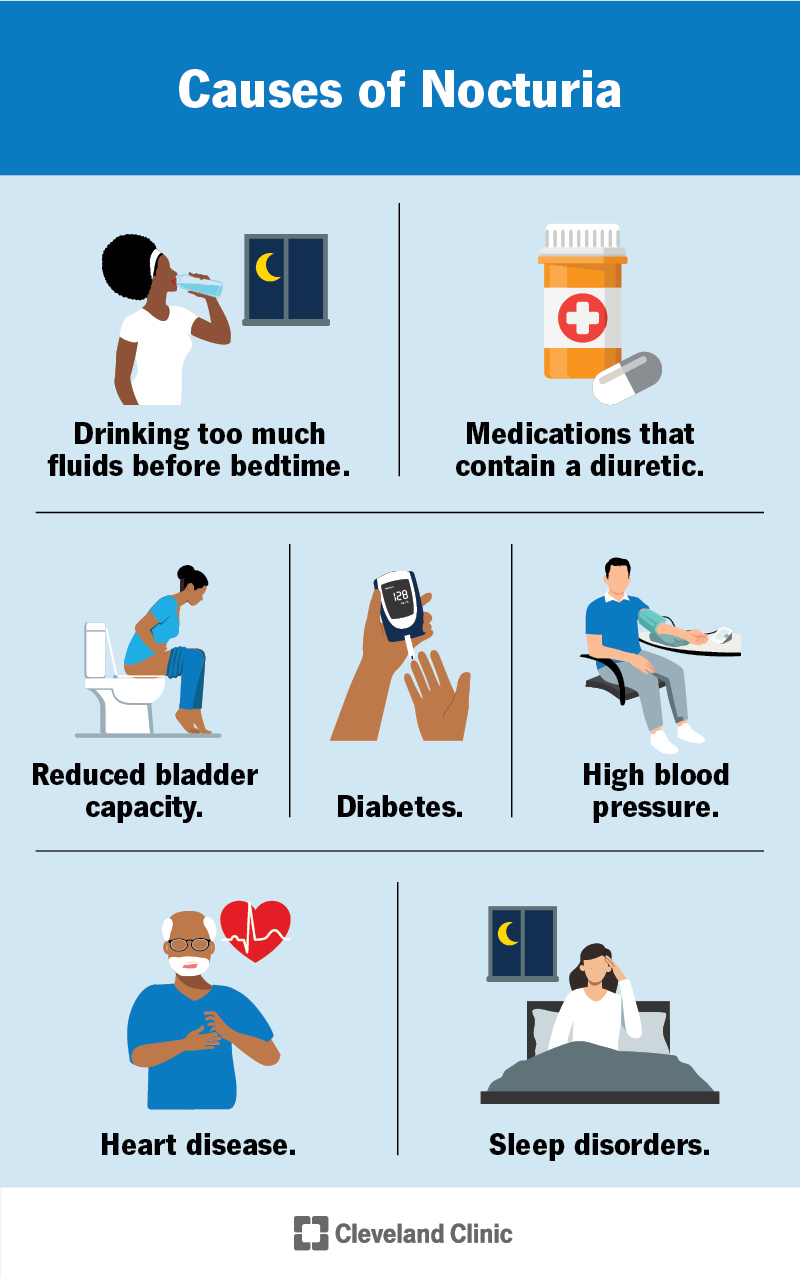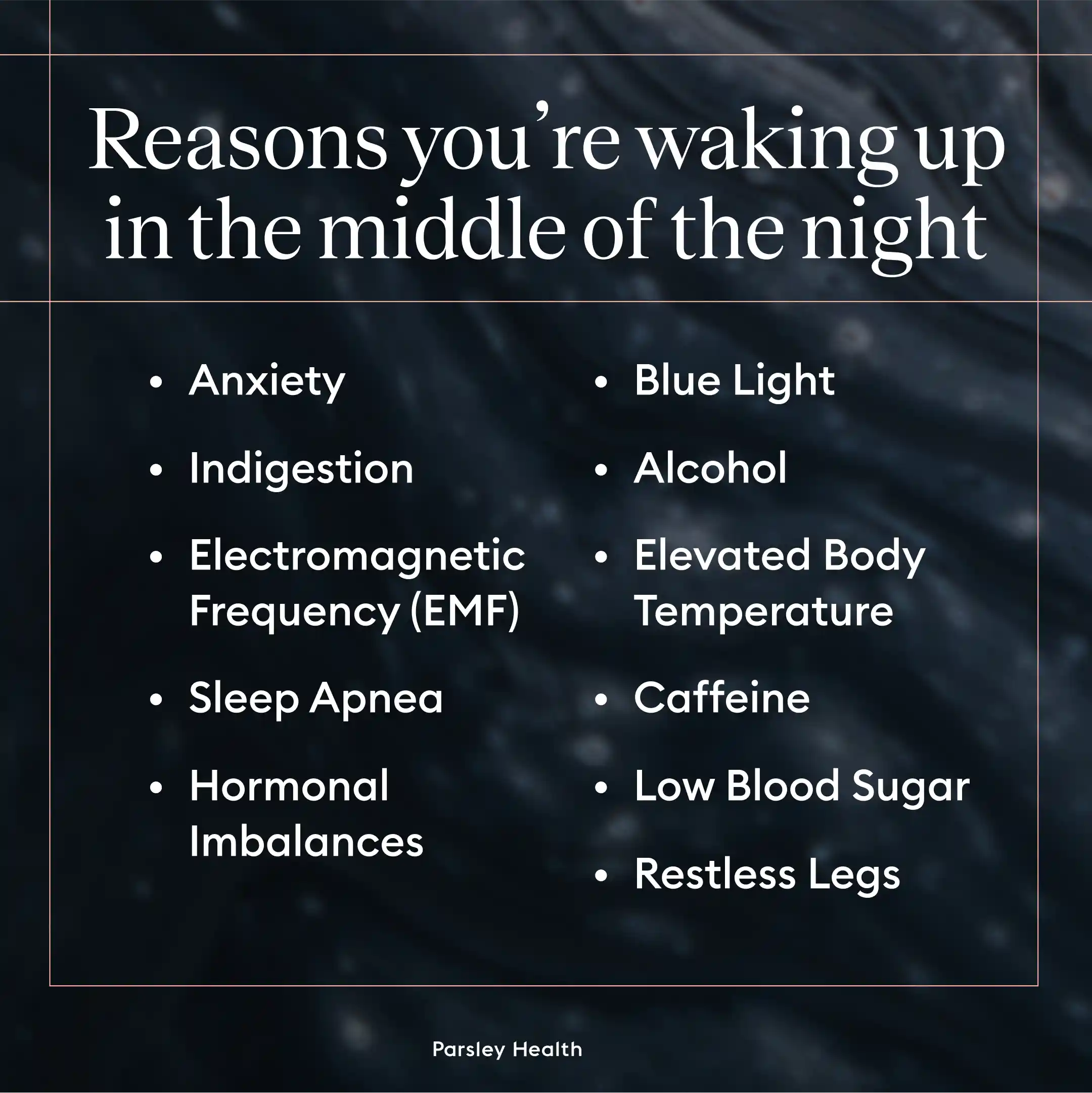Are you tired of waking up in the middle of the night, feeling restless and frustrated? You’re not alone.
Nighttime wake-ups can disrupt your sleep, leaving you exhausted and less focused during the day. But what if you could sleep through the night peacefully and wake up refreshed every morning? You’ll discover simple and effective ways to stop waking up at night.
These tips are easy to follow and can make a big difference in how well you sleep. Keep reading, and take the first step toward better, uninterrupted rest tonight.
Causes Of Nighttime Awakenings
Waking up at night is a common problem. Many factors cause these interruptions. Understanding these causes helps find the right solution. Nighttime awakenings can be due to mental, physical, or environmental reasons. Each factor affects sleep quality in different ways.
Stress And Anxiety Effects
Stress can make your mind race. Anxiety often leads to restless nights. When your brain stays active, it stops you from falling back asleep. Worrying about problems increases heart rate and alertness. This disrupts deep sleep phases. Managing stress is essential for better rest.
Sleep Environment Factors
Noise, light, and temperature impact sleep deeply. A noisy room wakes you up easily. Too much light confuses your body clock. A room too hot or too cold causes discomfort. A poor sleep environment prevents continuous, restful sleep. Creating a calm and dark space helps maintain sleep.
Diet And Lifestyle Influences
Eating late or heavy meals can disturb sleep. Caffeine and alcohol close to bedtime affect rest. Lack of exercise lowers sleep quality. Smoking also interrupts sleep cycles. A balanced diet and regular activity promote better sleep. Avoid stimulants in the evening to reduce awakenings.
Medical Conditions Impacting Sleep
Some health issues cause frequent nighttime waking. Sleep apnea blocks breathing and wakes you up. Acid reflux causes discomfort and disrupts rest. Chronic pain can prevent falling asleep or staying asleep. Mental health disorders also affect sleep patterns. Treating these conditions improves sleep quality.
Creating A Sleep-friendly Environment
Creating a sleep-friendly environment helps you stay asleep all night. Your bedroom plays a big role in how well you rest. Small changes can make a big difference for better sleep. Focus on comfort, quiet, and the right temperature. These factors reduce waking up during the night.
Optimizing Bedroom Temperature
Keep your bedroom cool. The best temperature is between 60 and 67 degrees Fahrenheit. A cooler room helps your body relax and fall asleep faster. Too hot or too cold can cause discomfort and wake you up. Use fans or air conditioning if needed. Adjust blankets to stay comfortable throughout the night.
Reducing Noise And Light
Silence is key for deep sleep. Block out noise using earplugs or white noise machines. Close windows and doors to keep outside sounds away. Use heavy curtains or blackout blinds to stop light from entering. Turn off all screens and dim any lights. Darkness helps your brain know it is time to sleep.
Choosing The Right Mattress And Pillows
Pick a mattress that supports your body well. It should be firm but comfortable. Old or sagging mattresses cause aches and restless nights. Choose pillows that keep your neck aligned. Your head should rest comfortably without strain. Replace pillows every 1-2 years to keep them fresh and supportive.
Effective Bedtime Routines
Creating an effective bedtime routine can help reduce waking up at night. It sets the body and mind to rest. A good routine prepares you for deep, continuous sleep. Small changes before bed can make a big difference. Consistency matters most to improve sleep quality.
Relaxation Techniques Before Sleep
Relaxing the body helps calm the mind. Try deep breathing exercises or gentle stretching. Reading a book or listening to soft music works well. Avoid stressful thoughts and focus on peaceful images. Relaxation signals the brain that it is time to sleep.
Consistent Sleep Schedule Benefits
Going to bed and waking up at the same time helps the body’s clock. This routine makes falling asleep easier. It also reduces waking during the night. The body learns when to expect rest and alertness. Consistency improves overall sleep quality and energy levels.
Limiting Screen Time At Night
Bright screens can confuse the brain and delay sleep. The light from phones, tablets, and TVs stops melatonin, the sleep hormone. Turn off devices at least one hour before bed. Try reading or meditating instead. This habit helps the body prepare naturally for sleep.

Credit: my.clevelandclinic.org
Diet And Exercise Tips
Diet and exercise play a big role in your sleep quality. What you eat and how you move affect how well you rest at night. Small changes can stop those wake-ups and help you sleep longer.
Foods That Promote Sleep
Certain foods help your body relax and prepare for sleep. Try eating foods rich in magnesium, like spinach and almonds. Bananas and oats contain natural chemicals that calm the mind. Warm milk can also ease you into sleep. These foods support your body’s natural sleep cycle.
Avoiding Stimulants And Heavy Meals
Avoid caffeine and nicotine late in the day. These stimulants keep your brain awake and alert. Stay away from heavy or spicy meals before bedtime. Large meals can cause discomfort and indigestion. Both make it harder to stay asleep through the night.
Timing And Type Of Physical Activity
Exercise helps reduce stress and improves sleep quality. Aim for moderate activities like walking or yoga. Finish workouts at least three hours before bed. Intense exercise too close to bedtime can raise your heart rate. This makes falling asleep more difficult.
Managing Stress For Better Sleep
Stress often disrupts sleep and causes waking up at night. Managing stress can help improve sleep quality and keep you asleep longer. Simple daily habits can calm the mind and body before bedtime. These habits reduce worry and prepare you for restful sleep.
Mindfulness And Meditation Practices
Mindfulness means focusing on the present moment. It helps stop racing thoughts that keep you awake. Meditation guides your mind to relax and let go of stress. Just 5 to 10 minutes of meditation before bed can ease tension. Try sitting quietly and paying attention to your breath or body sensations.
Breathing Exercises
Deep breathing slows your heart rate and calms your nervous system. This signals your body to relax and get ready for sleep. Try breathing in slowly through your nose for four seconds. Hold your breath for seven seconds. Exhale slowly through your mouth for eight seconds. Repeat this cycle a few times to feel calmer.
Journaling To Clear The Mind
Writing down your thoughts can clear your mind before sleep. It helps release worries and stressful feelings. Spend five minutes jotting down what’s on your mind. Focus on what you are grateful for or what went well today. This practice can reduce anxiety and stop nighttime wake-ups.
:max_bytes(150000):strip_icc()/why-do-you-wake-up-at-the-same-time-every-night-4137952_final1-7bb30714929b4c8ba6d054c2afedf953.jpg)
Credit: www.verywellhealth.com
When To Seek Professional Help
Waking up at night can happen to anyone. But sometimes, it signals a deeper issue. Knowing when to seek help is important for better sleep and health. Professional advice can guide you toward proper treatment and relief.
Identifying Sleep Disorders
Frequent waking might be more than just stress or noise. Sleep disorders like insomnia, sleep apnea, or restless leg syndrome can cause poor sleep. Watch for signs such as loud snoring, gasping for air, or uncontrollable leg movements. Feeling tired all day despite enough time in bed is another clue. These symptoms need evaluation by a doctor.
Consulting Sleep Specialists
Sleep specialists know how to diagnose and treat sleep problems. They may suggest a sleep study to monitor your sleep patterns. This test helps detect issues like breathing problems or unusual brain activity. Specialists provide tailored advice based on your condition and lifestyle. Early consultation improves chances for restful nights.
Possible Medical Treatments
Treatment depends on the diagnosed problem. Doctors might recommend CPAP machines for sleep apnea or medication for insomnia. Lifestyle changes such as better sleep hygiene or therapy can help too. Some conditions require ongoing care to manage symptoms effectively. Professional treatment reduces night awakenings and improves overall sleep quality.

Credit: www.parsleyhealth.com
Frequently Asked Questions
Why Do I Keep Waking Up At Night?
Frequent waking at night can be due to stress, poor sleep habits, or medical conditions. Identifying the cause helps improve sleep quality and maintain uninterrupted rest.
How Can I Prevent Waking Up During Sleep?
Establish a consistent bedtime routine, avoid caffeine and heavy meals before bed, and create a comfortable sleep environment to reduce nighttime awakenings.
Does Hydration Affect Waking Up At Night?
Drinking too much water before bed can cause nighttime bathroom trips. Limit fluid intake 1-2 hours before sleeping to minimize disruptions.
Can Stress Cause Waking Up At Night?
Yes, stress increases brain activity and disrupts sleep cycles. Practice relaxation techniques like meditation or deep breathing to promote restful sleep.
Conclusion
Waking up at night can feel frustrating and tiring. Small changes in your daily habits can help you sleep better. Try keeping a regular sleep schedule and avoid caffeine late in the day. Create a calm and dark environment for sleep.
Relax your mind before bed with quiet activities. Remember, good sleep supports your health and mood. Keep practicing these steps, and restful nights will follow. Sweet dreams start with simple actions tonight.
About
Amos Frank is a distinguished figure in the world of Diy sleep, with a decade of expertise creating innovative and sustainable Diy solutions. His professional focus lies in merging traditional sleep with modern manufacturing techniques, fostering sleep that are both practical and environmentally conscious. As the author of diy, Amos Frank into the art and science of sleep-making, inspiring artisans and industry professionals alike.
Education RMIT University
(Melbourne, Australia) Associate Degree in Design (Amos Frank) Focus on sustainable sleep, industry-driven projects, and practical sleep. Gained hands-on experience with traditional and digital manufacturing tools, such as CAD and CNC software.
Nottingham Trent University
(United Kingdom) Bachelor’s in sleepenify.com and sleep makeing (Honors) Specialized in product sleep with a focus on blending creativity with production techniques. Participated in industry projects, working with companies like John Lewis and Vitsoe to gain real-world insights.
Publications and Impact
In diy, Amos Frank his insights on indoor sleep processes, materials, and strategies for efficient production. His writing bridges the gap between artisan knowledge and modern industry needs, making it a must-read for both budding sleep and seasoned professionals.
